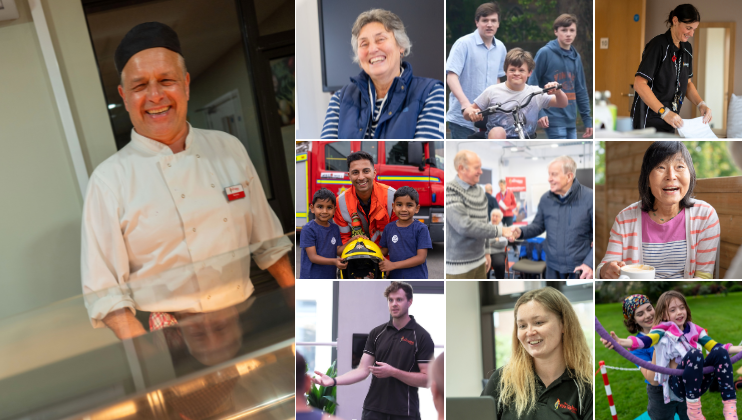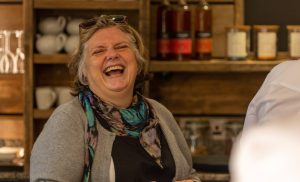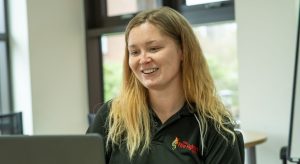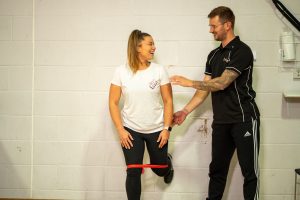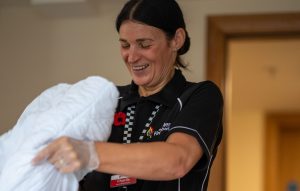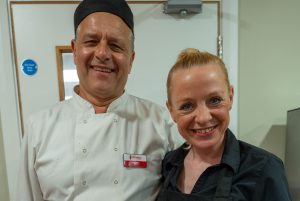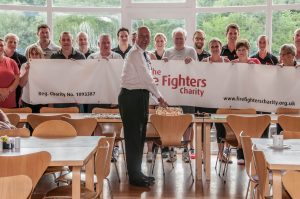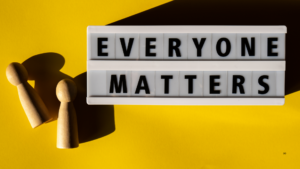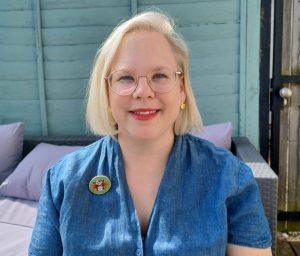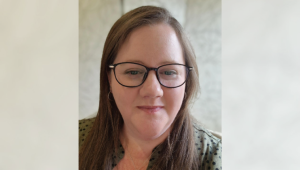Ensuring inclusion is the norm I Everyone can Thrive I Communicate our inclusive culture I Our journey so far I Experiences from our team
Ensure inclusion is the norm across our charity
To enhance our workplace culture and improve the level of inclusion within our Charity, everyone will understand what is expected of them in creating an inclusive environment. Everyday, inclusion is about awareness and understanding of the actions it will take to create a genuinely inclusive environment where every individual can be their unique self. We will consistently treat one another considerately, respectfully and fairly.
Create diverse and inclusive teams where everyone can thrive
For our people and culture to thrive, we appreciate the positive impact having a diverse range of people from various backgrounds and life experiences brings. In the UK, the Equality Act 2010 places a duty to not discriminate based on the nine protected characteristics (age, disability, sex, sexual orientation, gender reassignment, race, religion or belief, pregnancy and maternity leave, marriage and civil partnership). We will take this a step further and consider intersectionality, ensuring people can be their best self.
Communicate our inclusive culture internally and externally
As we work to improve and meet our strategic goals within diversity, equity and inclusion, we will also communicate this externally to influence future employees, volunteers, and our stakeholders. We want to be known as an inclusive organisation. To achieve this, we aim to communicate our priorities within inclusion. We recognise that stakeholders will have different lived experiences and levels of current understanding, and we commit to considering this in our approach to bring everyone on this journey with us.
Our journey so far
Our Culture
- In 2020, we revisited our organisational values and behaviours. Our employees, volunteers and other stakeholders were invited to take part in culture workshops where we considered the values that we saw in our organisation, what we would like to see, what we do well and what fantastic looks like.
- Lots of information was gathered during the workshops and our project team used this to define our values and the behaviours that describe them.
- From this, we created our Culture Code and our Culture Icons and recruited and trained Culture Champions. Our Champions each represent an area of our Charity and help drive behavioural change through acting as ambassadors for our brand and our values.
Inclusive Recruitment
- Our inclusion statement welcomes applications to join our Charity from all groups of people.
- To support us to gain better insight from our recruitment activities we invested in an online recruitment portal.
- The portal assisted us to streamline our application process making the process much more user friendly and accessible.
- We reviewed our Recruitment and Selection Policy and Procedure through an inclusive design lens, considering the language used throughout and being mindful of accessibility and ease of use for our recruiting managers and to ensure the best applicant experience.
- We have considered our advertising media and use targeted platforms to reach a diverse range of applicants in addition to our current advertising.
- We are reviewing our website and communications to showcase our inclusion activities.
- We will be transparent regarding our salaries and every role will be advertised with the salary as standard.
Learning and development
- As a result of the findings of our latest inclusion survey, focus groups and interviews, we delivered bespoke training for all our employees.
- We introduced a Diversity, Equity and Inclusion e-learning module to our learning management system. All employees and volunteers complete the e-learning on joining us as part of their induction activities.
- We have delivered Menopause Awareness training for our managers and introduced and implemented our Menopause Policy.
- We have delivered Neurodiversity training for our managers and developed a Neurodiversity Awareness webinar for all our employees.
- We are developing inclusion training for all levels of our Charity to explore topics such as privilege, psychological safety, inclusive leadership, inclusive decision making, allyship, anti racism, bullying and banter and inclusive recruitment.
Employee Voice, Communication and Awareness
- We will conduct an annual inclusion survey to understand the perception of how inclusive an environment our Charity is and publish our Inclusion report to showcase progress.
- We will develop our internal communications to inform all employees and volunteers of our overall inclusion approach, including how they will receive information and how to provide feedback.
- We will provide opportunities to actively participate and communicate chosen awareness days, weeks, months (e.g. International Women’s day, Neurodiversity Celebration Week, World Mental Health Week, Pride Month).
Experiences from our team
Below, our colleagues share their journeys with disability, equity and inclusion and open up about their neurodiversity, and how it impacts their lives.
Sorrel Griggs, Finance Officer (Committed Giving & Gift Aid)
When were you diagnosed with autism?
November 2013, a couple of years before my 30th birthday. It was a real lightbulb moment, helping me to understand some of the struggles I had experienced and allowing me to make adjustments to my life and plan for the future.
How does it impact you in day to day life?
Dealing with sensory inputs is a bit like having a really sensitive car alarm – you know it’s just the wind that set it off but you still have to go and turn the alarm off, and you know it will happen again in a minute! Managing sensory inputs uses a lot of my energy, so taking steps to minimise sensory surprises and stressors is really important. I can be very literal minded and have to remember to translate what people say into what they actually mean. When I’m really overwhelmed I stop being able to manage sensory inputs, go mute and cannot make eye contact. Grocery shopping can be very challenging!
Have the charity been supportive? If so, how?
Yes; I was up-front about my diagnosis at my interview and let the charity know that I struggle with phone calls, and function best if I have a really solid routine with advance notice of changes. My managers at the charity have always advocated for me and supported me not being available on the phone, and ensured that I am able to make use of my strengths. My role in the Finance Team dealing with Gift Aid and Payroll donations is a perfect fit – lots of regular scheduled tasks and strict rules to follow.
Do you feel it’s important to be open about living with a neurodiverse condition?
Yes; people aren’t mind-readers and they are unlikely to know about an invisible disability unless they are told – they just think I’m a bit odd! Invisible disabilities can be frustrating for everyone involved, because some people assume that you’re neurotypical and are surprised when you have a neurodivergent response to something. No-one should struggle in silence.
Sascha Wiltshire, Internal Communications & Engagement Manager
When were you diagnosed?
I was officially diagnosed with Right-Side Hemiplegia when I was three years old, after my parents realised that I was struggling with my coordination and balance. I was three months premature, and developed an infection in the incubator, which doctors believed could have affected the left side of my brain, resulting in a weakness to my right side. It has been compared to a form of cerebral palsy.
How does it impact you in day-to-day life?
I have always tried to be positive and take on tasks to the best of my ability, but there are moments, like when exercising and general day-to-day lifting and carrying, that I notice it more. I also get tired easily, so must pace myself throughout the working day…it took years for me to accept that my tiredness was often due to my disability! When the muscles in my hand start aching while typing at work, it can be frustrating.
Have the charity been supportive? If so, how?
Yes, they have. I used to try and hide my condition from people at work and would feel very self-conscious if someone looked at my hand. I didn’t want to be different. When I had my interview with the charity, it was the first time I openly talked about it. I was concerned about mentioning my condition to colleagues as I didn’t want them to think I was seeking attention, but that couldn’t have been further from the truth. Everyone has been supportive and doesn’t treat me any differently. I may struggle increasingly with my movement and joints on my right side as I get older, but I know I can talk openly with the charity and raise any concerns, and they will do their best to help.
Do you feel it’s important to be open about living with a disability?
Absolutely! Over time, I’ve learnt to accept my condition, rather than trying to hide it and comparing myself to others. I still feel frustrated at times, but having close friends and people you can turn to helps. It’s natural to have moments of doubt, but by being more open with people, I have definitely become more confident and resilient.
Emma Smith, Assessment Practitioner Team Manager
Our Assessment Practitioner Team Manager, Emma Smith, shares her story and how the charity has supported her in her role. Read about her journey here.
Below, you’ll hear from our amazing colleagues. They share personal stories about their experiences with their own mental health and wellbeing:
Sharon Bailey, Director of Beneficiary Services
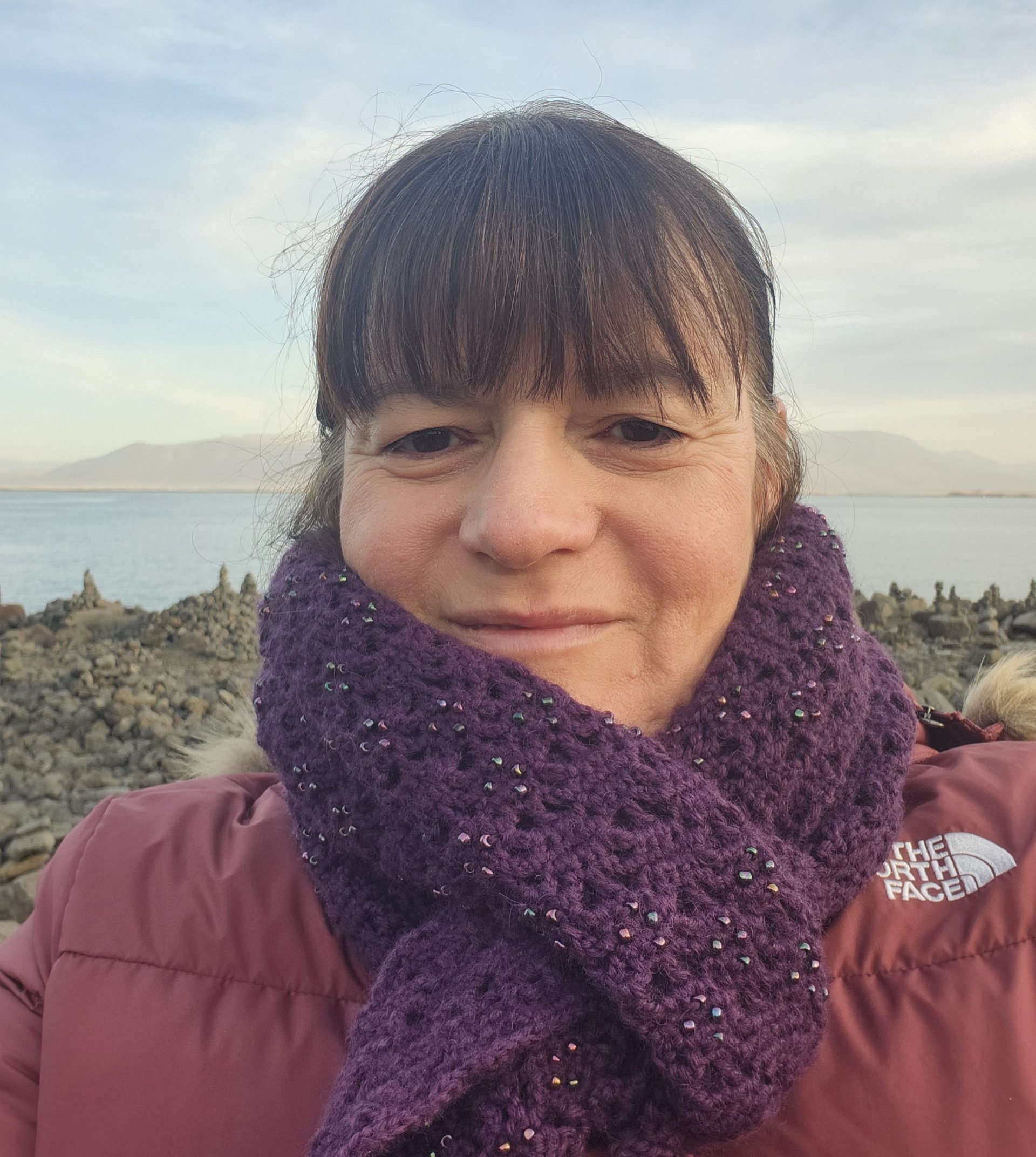
How do you manage your mental wellbeing day-to-day?
Various ways – spending time with family and friends is important. If I need quiet, reflective time then crochet is my go-to hobby – it helps me slow down, focus the mind and relax. Crochet can help reduce cortisol (the stress hormones) and the repetition of a craft such as crochet helps release the feel-good hormone, serotonin.
I also enjoy swimming – recently I have been using the outside pool at my gym and have found it very therapeutic – even when it’s been raining! When I am in the water, I manage to clear my mind and find a state of peace, plus I can’t take my mobile phone with me and that helps!
How do you manage a work/life balance?
This has been a challenge at times. The charity and the people we support is incredibly important to me and I want to give my best every day. I want to be there to support our amazing teams and provide the best service we can.
I realise, however, to do this I need to look after my wellbeing, self-care is important, however sometimes I need to check in to remind myself of this. Since I have rejoined the gym I have improved my work life balance, I book classes for after work and commit to attending – I ignore the gremlin on my shoulder telling me not to switch the laptop off! Once I have exercised and switched off from work, I do feel better and it means I approach the next day with renewed energy and focus. When I travel with work I ensure I take a crochet project with me so I have something else I can switch to in order to wind down.
What everyday practices help you to build your resilience? And what would you recommend to beneficiaries?
Setting goals helps, especially relating to exercise and eating healthily. I’m not perfect and I have my blips but it’s important not to beat yourself up if you do have a blip. Tomorrow is another day! I try to practice positive thinking and stay optimistic, understanding setbacks are temporary and I can overcome any challenges I face is key.
Building ‘me’ time into my day is critical. I am a nurse by profession, and I want to help others – so I can often put others’ needs before mine and this leaves little time for myself. I am slowly learning self-care isn’t selfish – it’s not easy though! Whether it’s time out to read, listen to music, crafting, exercise or cooking – whatever you enjoy doing, find that time and invest in your own wellbeing. I recall an article written by one of our psychological therapists using the oxygen mask analogy – this stuck with me – just as the oxygen mask procedure instructs passengers on a flight to secure their own mask before aiding others, prioritising self-care is essential. We can’t help others if we don’t look after our own wellbeing.
Do you find talking to friends/family/colleagues is beneficial to you when it comes to managing your wellbeing, particularly at challenging times?
Yes – I am incredibly lucky I have supportive family, friends and colleagues, both local to me and many miles away. I know that they are always there for me as I am for them. Sometimes it’s hard, I’m back in that world of being a nurse, someone who helps, and so I don’t want to show a crack in the armour, I need to be the strong one. Then I give myself a talking to – talking about our feelings is not a sign of weakness, it is part of taking charge of your wellbeing and doing what you can to stay healthy, it can be incredibly empowering and often a relief to share how we are feeling.
Kevin Biles – Sales Manager
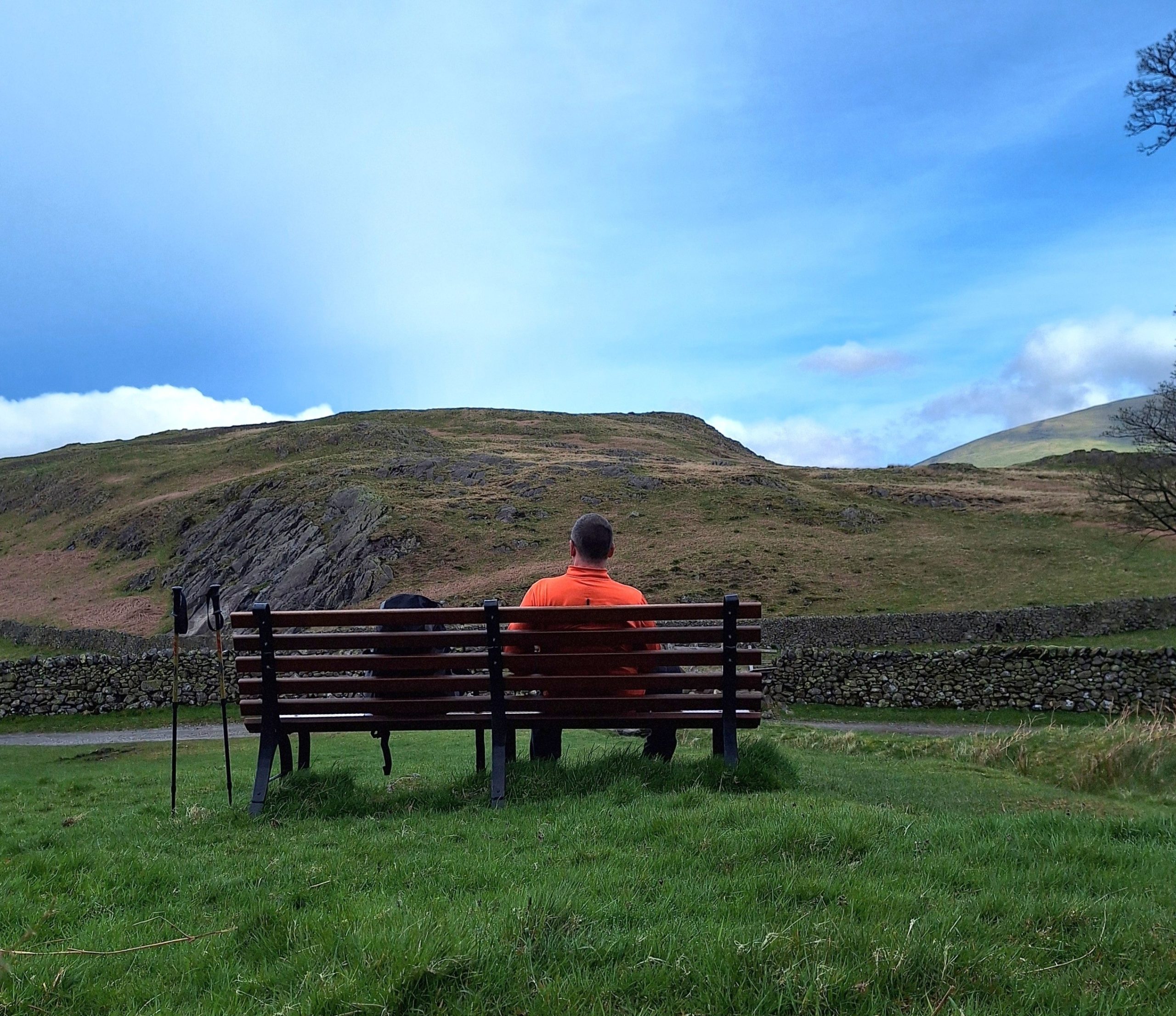
How do you manage your mental wellbeing day-to-day?
Being outside to escape, either on my own or in a group – whether that’s a running group, walking, mountain leading/hiking or supervising a Duke of Edinburgh (D of E) Award group.
My main ‘escape’ though is a run or a walk completely on my own, on trails, woodlands, forest, hills and sometimes mountains, usually before work as this sets me up for the day. The more remote the better! If I can include a wild camp or a stop-over, then even better.
My work is very people orientated, I spend a lot of time either face-to-face, online or on the phone throughout the day, and so these runs or walks are my ‘switch off’ time, taking in everything around me, birds, animals, flowers, countryside and trees… lots of trees!
How do you manage a work/life balance?
I’ll be honest and say I don’t think I do manage my work/life balance as well as I could. Work takes up a huge part of my day. But, this is where I do recognise the signs when it gets too much, and I have developed my own ‘personal support mechanism’ and will take myself outside to re-set doing one or a number of activities mentioned above.
I really struggle at times with the fast-paced ‘information now’ mode that we all seem to work in, and whilst I may recognise it in others and sometimes even suggest they take a break, like most (actually) all of us, we don’t practice what we preach. I will find a point when I know I need to ‘get outside and escape’ and that could be for an hour or it could be several days with a tent, walking boots and a stove to make a brew!
What everyday practices help you to build your resilience? And what would you recommend to others?
I will test myself and I love taking myself out of my comfort zone. That could be a mountain range that I need to trek through, it could be a long distance run or walk, or it may be putting myself in a situation that is not ‘run of the mill’.
More recently this now includes teaching youngsters (through D of E) how to navigate, how to set up camp, how to cook and how to respect the countryside. I am not a teacher, but when you see youngsters of all ages and abilities succeed in their expeditions and challenges, you can’t beat it. And their success is my success.
In summary, to build resilience, I sometimes throw myself into a challenge or situation that initially is uncomfortable, or not achievable (at that time), but with training, focus and pushing my boundaries… most of the time I will achieve them, and on occasion when I don’t, I’ll look back and either give it another go, or re-set the goal if necessary, but ensure it still takes me out of my comfort zone.
Lisa Courtney – Community Fundraiser
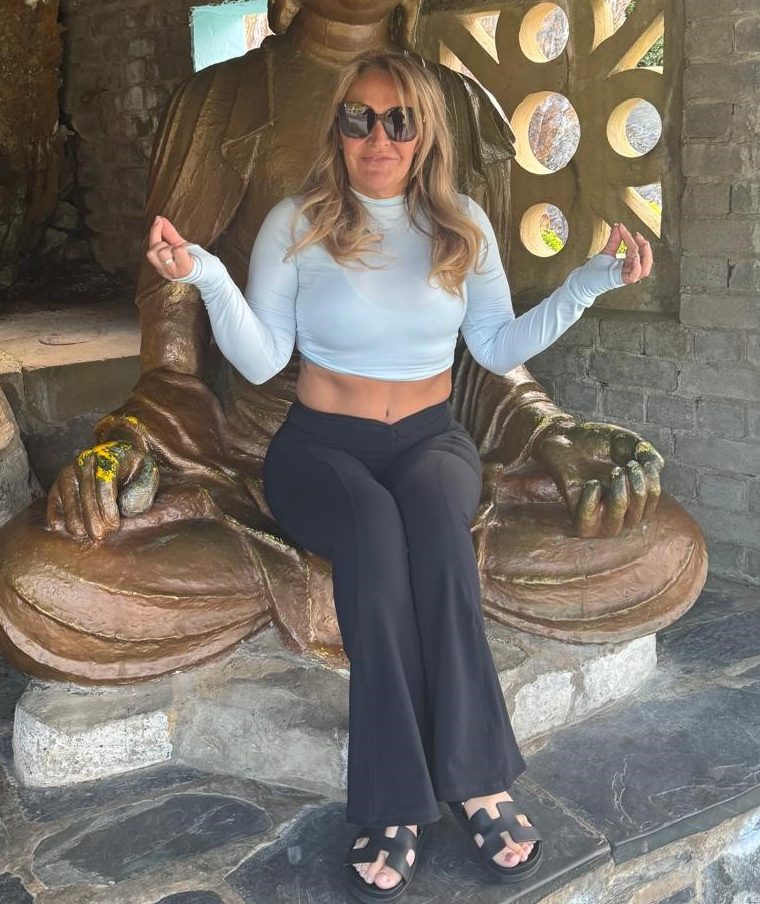
How do you manage your mental wellbeing day to day?
My mental wellbeing can depend on how I wake up, so I have learnt to live in the moment rather than worry about my past or what may happen in the future.
Most days I’m happy, energetic and thankful, I appreciate the outside, and enjoy exercise. I love Pilates, hiking and taking my two dogs out for long walks. I try to take at least 10 minutes in the day to switch off and take myself away from the noise, as well as jotting down in my journal things that I have gratitude for.
However, some days I wake up and it’s there, a dark cloud is how I describe it. I feel emptiness, sadness and hopeless. And I don’t want to talk to anyone.
People notice this as I’m very joyful most of the time. So, I make a point of wanting to talk about my mental health so if I’m in that dark place I can say to my family and colleagues ‘the big black dog is here’ and they now understand not to ask why, they allow me to process the journey and respect my honesty.
How do you manage a work/life balance?
I’m very lucky to have a great support network around me. Fire Fighters Charity really supports me by allowing me to be flexible in my working hours, so if I feel the need to go outdoors for a walk in the day, I flex my hours to suit how I feel.
This helps me to be more productive and in tune with my mind and body. Being a fundraiser means sometimes we get unsocial hours or long journeys in the car, but my manager always checks in and reminds me that burnout can easily happen, so I manage my time effectively.
What everyday practices help you to build your resilience? And what would you recommend to others?
Journaling. I have been doing it for years. I’m also reading a book called Lunar Living by Kirsty Gallagher which provides me with a toolkit to understanding moon cycles and the effects they have on us, and how working with them can help you live a more purposeful life. Mindfulness and focusing on the present day really help me.
Do you find talking to friends/family/colleagues is beneficial to you when it comes to managing your wellbeing, particularly at challenging times?
Being open and honest is the secret to living with my illness. I love to share how I feel, it helps to get a different perspective on the way I feel.
Has the charity been supportive? If so, how?
The charity supports me by allowing me to be my authentic self. I can talk openly about how my day is, good or bad. I use the My Fire Fighters Charity app for bitesize resources and online self-help too.
Charity resources
Find out about the ways we support our employees, including our Employee Assistance Programme, Headspace and flexible working:
And sign-up to our health and wellbeing space – My Fire Fighters Charity – via Android/Apple device or desktop, below:

